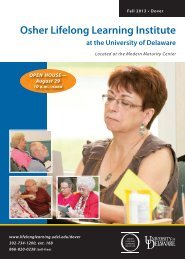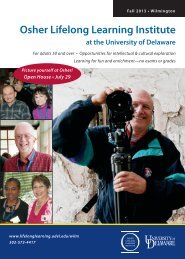Download the Fall 2013 catalog - Osher Lifelong Learning Institutes ...
Download the Fall 2013 catalog - Osher Lifelong Learning Institutes ...
Download the Fall 2013 catalog - Osher Lifelong Learning Institutes ...
You also want an ePaper? Increase the reach of your titles
YUMPU automatically turns print PDFs into web optimized ePapers that Google loves.
at <strong>the</strong> University of Delaware in Lewes <strong>Fall</strong> <strong>2013</strong><br />
SS75 TRADITIONAL CHINESE<br />
MEDICINE—A COMPLEMENTARY<br />
APPROACH TO WESTERN<br />
MEDICINE<br />
Tuesdays, 10:45 a.m.–12:15 p.m.<br />
Dates: 10 Sessions, September 10–November 12<br />
Instructors: Robert Yuan, Yuan Lin<br />
This course is a continuation of a short<br />
introductory course offered in <strong>the</strong> summer of<br />
<strong>2013</strong> and goes in greater detail into issues of<br />
scientific validation, clinical proof and use of<br />
Traditional Chinese Medicine (TCM) in <strong>the</strong><br />
context of <strong>the</strong> U.S. health care system. TCM<br />
has a long history dating over many centuries.<br />
TCM is directed toward maintaining health<br />
and preventing disease by combining lifestyle<br />
practices (e.g., diet, exercise, meditation),<br />
physical manipulations (e.g., massage and<br />
acupuncture) and herbal formulations. This<br />
is in sharp contrast to science-based Western<br />
medicine which has made rapid progress mainly<br />
through sensitive diagnostic methods, novel<br />
drugs and gene <strong>the</strong>rapy. More than a<br />
comparison between two systems of medicine,<br />
<strong>the</strong> course is designed to look at two<br />
philosophies of wellness and treatment, TCM<br />
practices, <strong>the</strong> regulatory process for drugs and<br />
<strong>the</strong> economics of health care. The course is not<br />
intended to look at TCM treatments for specific<br />
diseases. Each session consists of lectures and<br />
work sessions by student groups. Some reading<br />
and teamwork is expected. Individuals signing<br />
up for <strong>the</strong> course should have some<br />
understanding of medicine and/or biology and<br />
would preferably have taken <strong>the</strong> introductory<br />
course. Class is limited to 20 students.<br />
Robert Yuan and Yuan Lin have degrees in<br />
chemistry and doctorates in molecular biology<br />
and biochemistry from <strong>the</strong> Albert Einstein<br />
College of Medicine and University of California-<br />
Davis respectively. Robert Yuan has done basic<br />
research at Harvard University, Edinburgh<br />
University, University of Basel (Switzerland), <strong>the</strong><br />
National Cancer Institute and <strong>the</strong> University of<br />
Maryland College Park. Yuan Lin has done<br />
research at University of California-San Diego,<br />
University of Illinois, National Cancer Institute,<br />
DuPont and <strong>the</strong> Food and Drug Administration.<br />
Robert Yuan has more than 30 years of teaching<br />
experience at undergraduate, graduate and<br />
postgraduate levels. They have done research<br />
on TCM and for three years have taught an<br />
honors course on TCM at <strong>the</strong> University of<br />
Maryland College Park.<br />
SS76 THE ASTROLABE<br />
Wednesday, 3:15 p.m.–4:45 p.m.<br />
Dates: 1 Session, September 11<br />
Instructor: James Morrison<br />
The astrolabe was by far <strong>the</strong> most popular<br />
astronomical instrument before <strong>the</strong> telescope.<br />
This brief lecture includes nontechnical<br />
descriptions of how <strong>the</strong> astrolabe is used to<br />
solve astronomical problems and an overview<br />
of its history. Prerequisites: some background<br />
in astronomy helpful but not required.<br />
Class is limited to 65 students.<br />
James Morrison is retired from a 37 year career<br />
in computing. He is <strong>the</strong> author of The Astrolabe,<br />
<strong>the</strong> most complete astrolabe treatise available. He<br />
has a B.S. in physics from Oklahoma State<br />
University and an M.S. in systems engineering<br />
from Sou<strong>the</strong>rn Methodist University.<br />
SS77 OBSERVATION OF THE 1769<br />
TRANSIT OF VENUS IN LEWES<br />
Wednesday, 3:15 p.m.–4:45 p.m.<br />
Dates: 1 Session, September 18<br />
Instructor: James Morrison<br />
The American Philosophical Society sent a team<br />
to observe <strong>the</strong> 1769 transit of Venus. This lecture<br />
is a slight expansion of <strong>the</strong> version presented to<br />
<strong>the</strong> Lewes Historical Society on May 25, 2012. It<br />
includes <strong>the</strong> scientific basis for <strong>the</strong> expedition<br />
and describes <strong>the</strong> equipment and methods used<br />
to pinpoint <strong>the</strong> observatory location.<br />
Class is limited to 65 students.<br />
James Morrison. See course SS76 for<br />
instructor’s information.<br />
www.lifelonglearning.udel.edu/lewes 29





